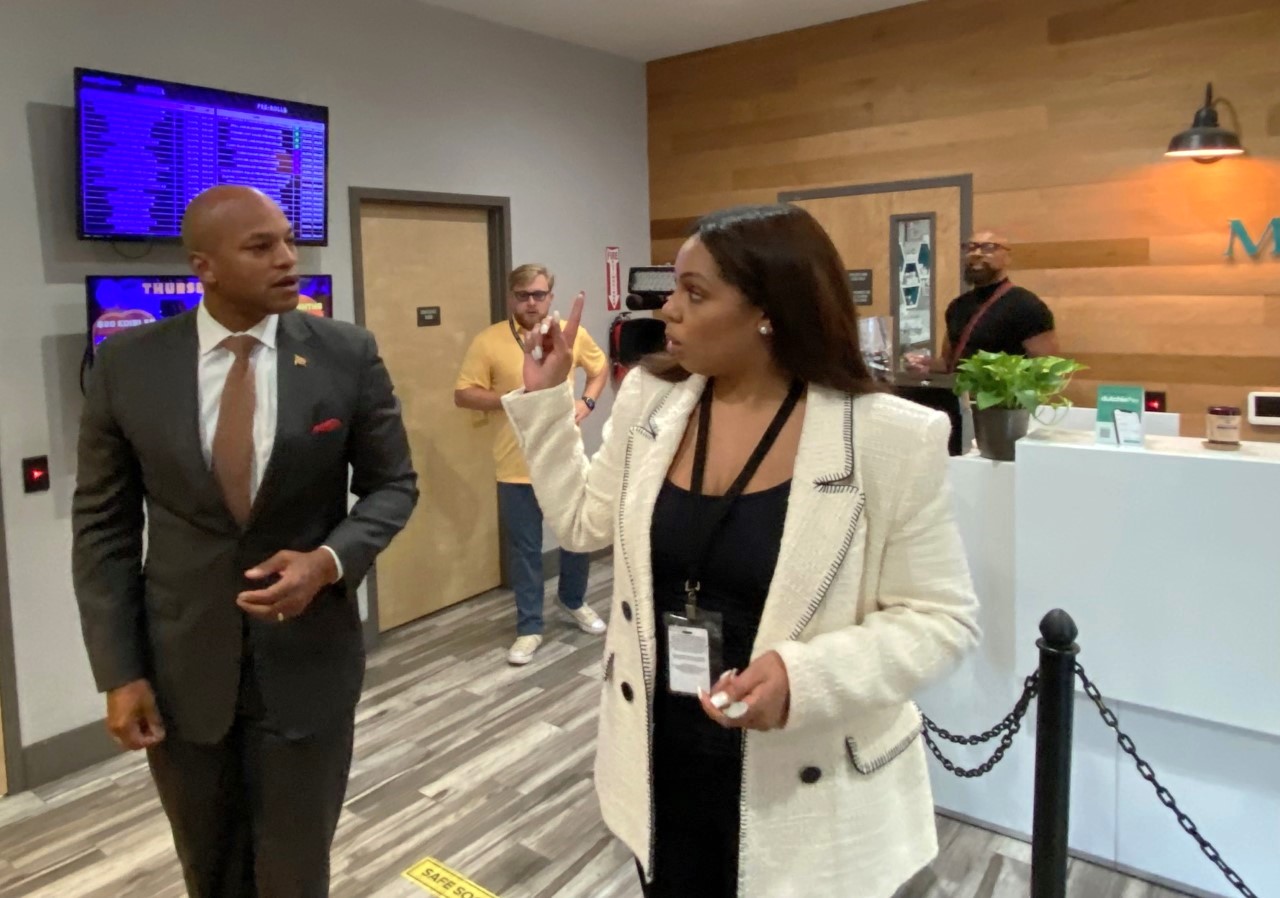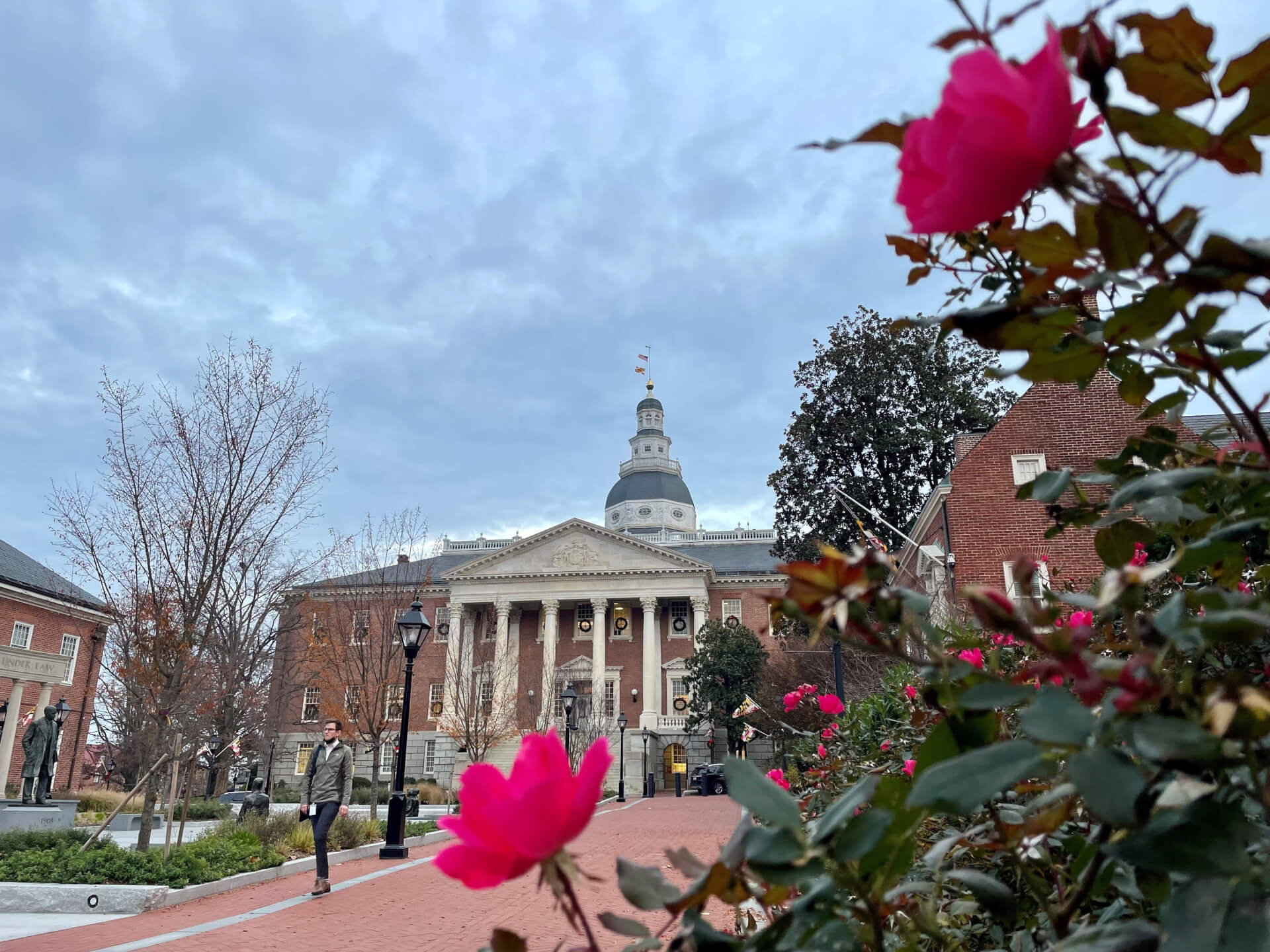Moore visits pot dispensary, praises Biden pardon announcement on simple marijuana possession

Just minutes after President Biden on Thursday announced executive actions that would pardon thousands of people with prior federal offenses of simple marijuana possession, Wes Moore, the Democratic candidate for governor, listened to Black entrepreneurs at Mary & Main, a medical cannabis dispensary in Capitol Heights.
With Election Day less than five weeks away, and voters in Maryland expected to approve a measure to legalize the use and sale of recreational cannabis, Moore’s visit not only focused on ways to establish equitable drug laws in the state, but also how to improve Black representation in the cannabis industry.
Moore held a roundtable discussion with Black entrepreneurs at Mary & Main, one of the few Black-owned dispensaries in the state, and the conversation touched on Biden’s pardons.
Moore said with the cannabis industry growing, statewide policy changes must address such topics as automatic criminal record expungements, the racial wealth gap and economic disparities.
“I applaud the president’s decision. I think it is something that’s been overdue on the federal side,” Moore said outside the dispensary. “I also applaud the president for asking governors to follow his lead. I know that if I have the opportunity to be the next governor of Maryland, we are going to follow that lead…It’s time that our states do right and I’m thankful for the leadership that the president showed us.”
Biden said he will ask U.S. Secretary of Health and Human Services Xavier Becerra and Attorney General Merrick Garland to review how marijuana is classified under federal law as a Schedule I drug, the Drug Enforcement Agency’s most dangerous classification that includes substances like heroin and LSD.
“Sending people to prison for possessing marijuana has upended too many lives and incarcerated people for conduct that many states no longer prohibit,” Biden said in a statement.
Biden plans to call on governors to follow suit with state offenses related to simple marijuana possession. His executive order to pardon simple possession includes the District of Columbia as well as people convicted in the federal court system.
“Just as no one should be in a federal prison solely due to the possession of marijuana, no one should be in a local jail or state prison for that reason, either,” Biden said.
The move is intended to address the country’s “failed approach to marijuana,” a senior administration official said Thursday afternoon minutes before the announcement.
Recreational use of marijuana is legal in 19 states, including the District of Columbia, but there is still a mix of laws related to the drug. In 38 states, marijuana is allowed for medical purposes.
There are several states where marijuana is illegal in all forms, recreational or medical.
Civil rights organizations and researchers have shown that charges for marijuana possession disproportionately affect Black and brown communities. For example, the ACLU found that Black people were 3.7 times more likely to be charged with marijuana possession compared to white people.
Police made 663,000 arrests for marijuana-related offenses in 2018, according to FBI data, which amounted to 40% of all drug arrests for that year.
Senior administration officials said that even if a person has not been charged or convicted of a marijuana possession, as of Thursday’s date, “the pardon does cover that conduct.”
The Department of Justice will create an administrative process for those who are pardoned to obtain a certificate of their pardon “so that they will have documentation that they can show to law enforcement, employers and others as needed,” a senior administration official said.
States began decriminalizing or legalizing recreational use of marijuana in 2012, when Colorado and Washington voters passed statewide ballot measures. Over the next decade, 17 more states followed suit. Those states have operated for years in conflict with federal laws that have kept the substance strictly illegal.
The U.S. House passed legislation earlier this year to legalize marijuana nationally, but the bill failed to gain traction in the Senate.
The House voted 220-204 to approve the measure, which would fix the split between federal law and states where recreational marijuana is legal. Three Republicans joined all but two Democrats in approving the bill.
Democratic lawmakers reacted positively to Biden’s announcement, and several called for full legalization.
House Speaker Nancy Pelosi (D-Calif.) said federal drug policies relating to marijuana have harmed communities of color, and torn families apart.
“These transformative actions are the latest manifestation of Democrats’ unyielding commitment to justice, especially for those unfairly harmed by cannabis criminalization,” she said in a statement.
Many more Democrats than Republicans commented on the move, which is in line with most Americans’ views on marijuana. A MorningConsult/Politico poll this month found that 60% of respondents favored legalization.
Republicans who did comment largely framed the initiative as soft on crime. Republicans are making rising crime rates a campaign issue in next month’s elections.
“In the midst of a crime wave and on the brink of a recession, Joe Biden is giving blanket pardons to drug offenders — many of whom pled down from more serious charges,” Sen. Tom Cotton, a Republican of Arkansas, said on Twitter. An earlier version of the tweet, which was deleted after nine minutes, complained of pardons to “pot heads.”
Arkansas Gov. Asa Hutchinson (R), who is retiring this year, said in a statement that the Justice Department should not issue “blanket pardons” and each offender should be looked at individually. Hutchinson was the director of the Drug Enforcement Administration under President George W. Bush.
“As Governor I have issued hundreds of pardons to those who have been convicted of drug offenses,” he said. “But in this time of rising crime there should a clear record of law-abiding conduct before pardons are issued.”
Schedule 1 drug
Unless Congress changes federal marijuana laws or the president takes further action, marijuana is likely to stay classified as a Schedule 1 drug for the near future.
Senior administration officials said Thursday it will take a while for the HHS secretary and the attorney general to assess if marijuana should stay in the highest classification or drop to a lower category within the DEA’s system.
“The process will take some time, because it must be based on a careful consideration of all of the available evidence, including scientific… and medical information that’s available,” the senior administration official said, adding that while Biden hasn’t set a timeline he wants the review to be “expeditious.”
The DEA has five schedule classifications for legal and illegal drugs, with Schedule 1 including substances with a high potential for abuse and no medical use. Heroin, LSD and peyote are classified as Schedule 1 drugs along with marijuana.
The next category, Schedule 2 is supposed to host drugs with a high potential for abuse and that can lead to “severe psychological or physical dependence,” according to the DEA. Cocaine, fentanyl, methamphetamine and oxycodone are all currently classified as Schedule 2.
Schedule 3 includes substances with a low to moderate likelihood of physical and psychological dependence, such as anabolic steroids and testosterone. Schedule 4 hosts drugs like Xanax, Valium and Ambien that have a low potential for abuse, according to the DEA. And Schedule 5 includes substances with a lower possibility of abuse than Schedule 4.







 Creative Commons Attribution
Creative Commons Attribution